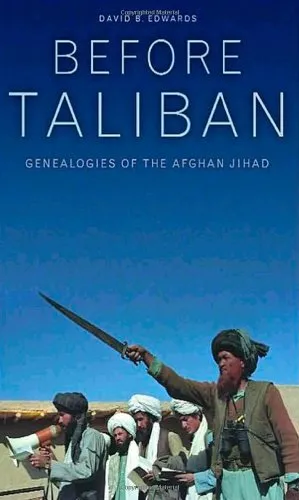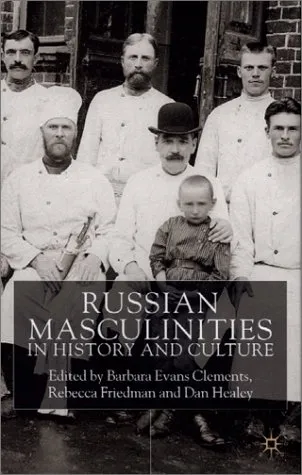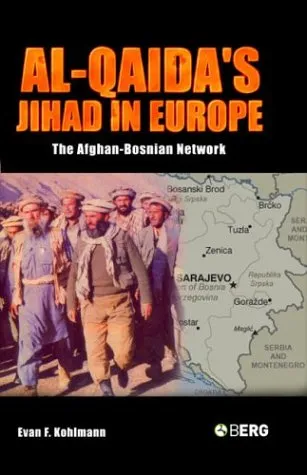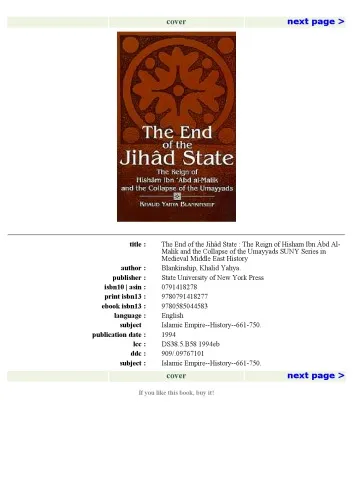Before Taliban: Genealogies of the Afghan Jihad
4.5
Reviews from our users

You Can Ask your questions from this book's AI after Login
Each download or ask from book AI costs 2 points. To earn more free points, please visit the Points Guide Page and complete some valuable actions.کتاب های مرتبط:
Introduction to "Before Taliban: Genealogies of the Afghan Jihad"
Written by David B. Edwards, Before Taliban: Genealogies of the Afghan Jihad is an insightful and profound exploration of the historical, cultural, and social forces that shaped modern Afghanistan and eventually led to the rise of the Taliban. This book provides a comprehensive and nuanced understanding of how long-standing tribal customs, political upheavals, and external interventions have defined the trajectory of Afghan society and politics. Edwards combines rigorous academic research with in-depth fieldwork to weave a compelling narrative that illuminates the prelude to the contemporary conflicts in Afghanistan.
Edwards traces the genealogies of Afghan jihad by delving into the lives and stories of key historical figures, analyzing the interplay between ideology, tribal loyalties, and the tumultuous events that saw the transformation of Afghanistan into a hotbed of radicalism. Through its focus on anthropology and history, the book captures the complex and multidimensional nature of Afghan society, tracing the roots of the ideological and social tensions that culminated in the Taliban's rise to power.
This book is essential reading for anyone interested in understanding the historical precursors of the Taliban movement and the broader dynamics of conflict in Afghanistan. More than simply a study of political Islam, Before Taliban is a humanistic investigation into the lives of individuals and the cultural fabric of a society irreversibly impacted by decades of war and external intervention.
Detailed Summary of the Book
Before Taliban spans decades of Afghan history, focusing particularly on the sociopolitical conditions leading to the Soviet invasion in 1979, the Afghan resistance during the 1980s, and the eventual eruption of radicalism in the 1990s. Edwards explores three central figures in Afghanistan's political evolution—Sabghatullah Mojaddidi, Bacha Khan, and Najibullah—through their personal stories and political roles. These figures serve as the focal points for examining the intersecting forces of religion, tribalism, and modernity in shaping Afghan society.
Edwards paints a portrait of Afghan society torn between traditional tribal structures and the modernizing (often externally imposed) forces of the state. The book delves deep into the relationships between regional and global powers, illustrating how the Cold War politics of the United States and the Soviet Union exacerbated local divisions. Edwards also documents how tribal loyalties and Islamic ideologies were mobilized, manipulated, and repurposed during the jihad against Soviet forces, eventually becoming the ideological foundation for the Taliban’s extremist policies.
One of the book's defining strengths is its focus on human narratives. By bringing the experiences of individual Afghans to the forefront, Edwards provides a poignant account of how ordinary people navigated extraordinary turmoil and dislocation. It is a scholarly yet accessible analysis of Afghanistan’s jihad and its repercussions on a national and global scale.
Key Takeaways
- Afghanistan's political and social trajectory has been heavily influenced by the interplay between tribal customs, Islamic ideologies, and the agendas of external powers.
- The Soviet invasion and subsequent U.S. involvement in Afghanistan created a highly militarized society, paving the way for radicalism and extremism.
- Through the lens of anthropology, Edwards reveals how cultures are reshaped during times of prolonged conflict.
- The Taliban's ascent was not an isolated historical event but rather a culmination of decades of political, social, and ideological transformations in Afghanistan.
- The human stories underlying Afghanistan's political history are crucial to understanding the broader narrative of the Afghan conflict.
Famous Quotes from the Book
"The jihad was not simply a religious war; it was a cultural revolution, one that transfigured the landscape of Afghan society and the lives of the people within it."
"In Afghanistan, history is not an unbroken chain of cause and effect, but rather a kaleidoscope of overlapping images and events."
"To understand the Taliban is to understand the genealogy of Afghan jihad, a process forged not only in blood but in the imagination of a nation in perpetual conflict."
Why This Book Matters
Before Taliban is more than just a historical account—it is a lens through which readers can gain critical insights into the enduring complexities of Afghanistan’s culture, history, and politics. By grounding his analysis in both anthropological and historical methods, Edwards demonstrates the importance of understanding the cultural underpinnings of political events, rather than relying on reductive or surface-level interpretations.
As Afghanistan continues to grapple with conflict and instability, this book remains highly relevant. It is indispensable for students, scholars, policymakers, and general readers seeking to understand the origins of modern Afghan political dynamics, the lasting effects of the Cold War, and the precursors to global issues such as terrorism and extremism. By revealing the lived experiences and cultural context of Afghans during tumultuous periods, Edwards challenges us to rethink simplistic narratives about Afghanistan and the rise of the Taliban.
Free Direct Download
You Can Download this book after Login
Accessing books through legal platforms and public libraries not only supports the rights of authors and publishers but also contributes to the sustainability of reading culture. Before downloading, please take a moment to consider these options.
Find this book on other platforms:
WorldCat helps you find books in libraries worldwide.
See ratings, reviews, and discussions on Goodreads.
Find and buy rare or used books on AbeBooks.
1369
بازدید4.5
امتیاز0
نظر98%
رضایتReviews:
4.5
Based on 0 users review
Questions & Answers
Ask questions about this book or help others by answering
No questions yet. Be the first to ask!














